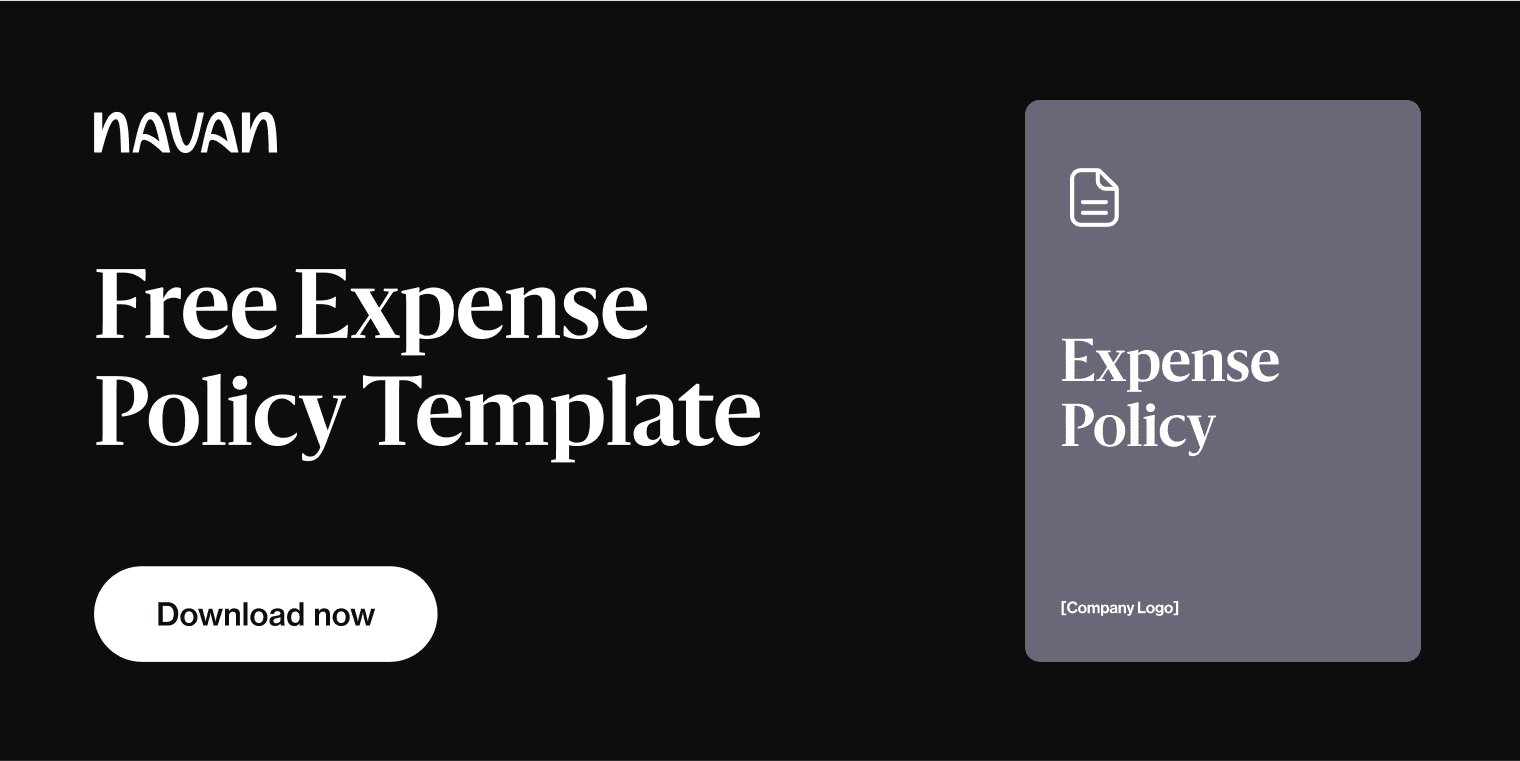Corporate Credit Card Policy: Guidelines and Best Practices

When employees have access to corporate credit cards, clear guidelines are essential for keeping company spend in check and running operations smoothly. Without a structured policy, businesses risk budget overruns, unauthorized purchases, and compliance headaches. On the other hand, a well-crafted corporate credit card policy helps protect company finances, simplify expense tracking, boost accountability, and foster a culture of responsible spending.
This guide explores the fundamentals of a corporate credit card policy and covers essential components, best practices, and common challenges.
What Is a Corporate Credit Card Policy?
A corporate credit card policy is a set of rules and guidelines that govern how employees use company-issued credit cards for business-related expenses. It establishes spending limits, outlines approved purchases and defines reporting requirements.
Companies implement these policies to maintain financial transparency, prevent unauthorized transactions, and help keep corporate spending aligned with company objectives.
7 Key Components of an Effective Corporate Credit Card Policy
To maintain financial discipline and operational efficiency, a corporate credit card policy should include the following key elements:
1. Eligibility Criteria
Define which employees are eligible to receive a company-issued credit card. Eligibility may depend on job roles, travel frequency, or seniority within the organization.
2. Approved Expenses
Clearly outline which expenses employees can charge to their corporate cards. Typically, approved expenses include travel costs (flights, hotels, meals), office supplies, and client entertainment.
3. Spend Limits
Set expense limits based on employee roles and spending needs. Some businesses establish daily, weekly, or monthly caps to prevent excessive charges. For example, senior executives or frequent travelers may have higher limits due to their business needs, while employees with occasional travel requirements might have more restrictive caps.
4. Reporting and Documentation
Employees should be required to submit receipts for every transaction to maintain transparency and accuracy in expense tracking. Using an expense management platform like Navan streamlines this process by automatically processing receipt details and syncing data with the company’s ERP system.
5. Consequences of Misuse
Specify the penalties for policy violations, such as unauthorized purchases or delayed reporting. Consequences may range from written warnings to card revocation or financial reimbursement for unauthorized expenses. In cases of deliberate misuse or fraudulent activity, companies may take more serious actions, including permanent revocation of the corporate credit card, formal disciplinary action, or even termination of employment.
6. Reconciliation and Approval Processes
Establish a process for reviewing, approving, and reconciling expenses. Automating these steps with expense management tools can reduce administrative burdens and improve accuracy.
7. Security and Fraud Prevention
Outline security measures such as card activation procedures, PIN protection, and immediate reporting of lost or stolen cards. Employees should also be aware of fraudulent activities and how to avoid them.
Best Practices for Implementing a Corporate Credit Card Policy
Rolling out a corporate credit card policy requires careful planning and communication. To optimize policy implementation and maximize efficiency and compliance, companies should follow these practical strategies:
1. Provide Employee Training
Educate employees on policy guidelines, spending limits, and reporting procedures. Training sessions or written manuals can help clarify expectations and prevent misuse.
2. Leverage Automation for Expense Tracking
Use corporate expense management software like Navan to automate reporting, flag policy violations, and track spending patterns in real time.
3. Conduct Regular Audits
Periodic audits help identify inconsistencies, detect unauthorized spending, and maintain adherence to policy rules. Reviewing transactions regularly helps prevent fraud and optimize expense management.
4. Maintain Clear Communication
Employees should have easy access to the policy documentation and updates. Providing a dedicated resource, such as an internal portal, will help employees understand spending guidelines.
5. Establish a Transparent Approval Process
A well-defined approval workflow streamlines reimbursement and minimizes disputes. Assigning approvers based on departments or spending thresholds improves accountability.
Benefits of a Corporate Credit Card Policy
By improving financial management and streamlining expense reporting, a well-structured corporate credit card policy benefits both employers and employees..
For Employers:
- Better cost control: Clearly defined spending limits prevent budget overruns.
- Reduced risk of fraud: Regular monitoring and approval workflows minimize unauthorized transactions.
- Simplified expense management: A clear policy allows for streamlined spend procedures and expense tracking.
For Employees:
- Convenient transactions: Employees don’t have to use personal funds and wait for reimbursements.
- Clear spending guidelines: Knowing approved expenses helps prevent confusion and policy violations.
- Faster approval processes: Streamlined workflows reduce delays, allowing transactions to be reviewed and processed more efficiently.
Common Challenges and Solutions in Corporate Credit Card Management
Even with a strong policy in place, companies often encounter challenges in managing corporate credit card programs. Here are some common issues and ways to address them:
1. Unauthorized or Excessive Spending
Some employees may misuse corporate credit cards for personal expenses. Implementing automated spending controls and requiring pre-approvals for large transactions can mitigate this risk.
2. Delayed or Inaccurate Expense Reporting
Late or incomplete reporting can disrupt accounting processes. Expense management tools like Navan help employees submit reports in real time and reduce errors and delays.
3. Policy Non-Compliance
Employees may fail to follow guidelines due to a lack of awareness or oversight. Regular training sessions and clear documentation help reinforce policy adherence. Integrating expense management software automates policy enforcement, reducing confusion and preventing unauthorized transactions.
4. Reconciliation Difficulties
Manually reconciling expenses across multiple employees can be time-consuming and increase the risk of discrepancies. Businesses can streamline this process by integrating corporate cards with an expense management platform that automatically reconciles expenses.
How Navan Can Assist in Corporate Credit Card Management
Navan’s expense management solution streamlines the connection of corporate credit cards to the platform to equip businesses with tools that simplify expense tracking, automate policy enforcement, and provide real-time financial insights.
Navan’s platform integrates seamlessly with corporate credit cards to help companies:
- Automate expense tracking: Every transaction is logged and categorized instantly.
- Streamline approval workflows: Designated approvers receive automatic alerts for relevant transactions, allowing for faster review.
- Monitor spend in real-time: Gain visibility into employee expenses as they occur.
- Enforce policy compliance: Automated alerts flag out-of-policy transactions.
- Simplify reconciliation: Integration with accounting software reduces manual work.
Navan corporate cards: Expense management built into every card swipe
Take the hassle out of expense management with Navan Corporate Cards. Every swipe is automatically tracked, categorized, and checked against your company’s policies — giving you total control without the manual work.
Get to know the Navan corporate card benefits:
With Navan’s corporate cards, you can turn your corporate card into a real-time expense management solution.
Meet Navan
Navan is a comprehensive travel and expense management platform designed to help businesses gain full control over their corporate spend. With advanced automation, real-time tracking, and seamless integration, Navan helps organizations implement effective corporate credit card policies with ease.
FAQs
What is a corporate credit card policy?
A corporate credit card policy is a set of guidelines that governs how employees use company-issued credit cards for business expenses. It includes rules on approved purchases, spending limits, and reporting procedures.
Why is a corporate credit card policy important?
A clear policy prevents misuse, improves financial transparency, and simplifies expense management. It helps businesses control spending while ensuring employees have access to necessary resources.
How can companies enforce a corporate credit card policy?
Enforcement can be achieved through training, automated expense tracking, regular audits, and real-time spending alerts. Navan’s tools help businesses maintain compliance automatically.
What are the consequences of violating a corporate credit card policy?
Depending on the severity of the violation, the consequences may range from requiring reimbursement for unauthorized expenses to revoking card privileges or taking disciplinary action.
A well-implemented corporate credit card policy is essential for managing business expenses efficiently. Navan’s platform provides the tools companies need to maintain financial control, simplify reporting, and enforce compliance with ease. Schedule a demo today to see how Navan can transform your corporate credit card management.
This content is for informational purposes only. It doesn't necessarily reflect the views of Navan and should not be construed as legal, tax, benefits, financial, accounting, or other advice. If you need specific advice for your business, please consult with an expert, as rules and regulations change regularly.
More content you might like
Take Travel and Expense Further with Navan
Move faster, stay compliant, and save smarter.

